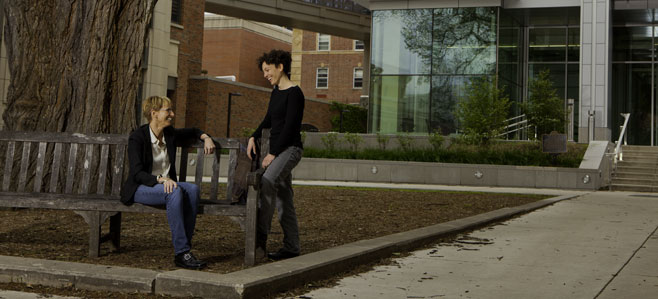
Professor Laura Kiessling, left, and alumna Caroline Davis are linked by gifts from James Mao.
In the warren of gardens inside the 4.5-acre conservatory at Longwood Gardens outside Philadelphia, James Chieh-Hsia Mao (MA ALS ’58, PhD ALS ‘64) never hesitates as he winds his way through tropical forests, banks of hibiscus and indoor gardens blooming with blue delphiniums, orange begonias and deep pink hydrangeas. Keeping up is the challenge as the spry 85-year-old finds his way to the orchids, the living green wall and out to the dancing fountains.
While he introduces visitors to the gardens where he spent a decade as a volunteer, Mao’s generosity to the University of Wisconsin-Madison is powering an investigation that could lead to new treatments for tuberculosis. The disease, including extensively drug-resistant strains, affects a third of the world’s population. His generosity has benefited many:
- As state and federal dollars shrink, the Laurens Anderson Professorship, which Mao endowed in honor of his mentor, gives Professor Laura Kiessling flexibility to pursue the study of carbohydrates that play an important role in cell development, immune system function and disease. She’s used the professorship funding to hire a post doc researcher and administrative assistance for a Chemistry-Biology Interface Training Grant that supports students across campus. “These sorts of contributions now can have so much more effect than they would have even 10 years ago,” she said.
- The Mao Wisconsin Distinguished Graduate Fellowships help students including Caroline Davis (2007 PhD ALS), who’s a scientist at Promega in Madison, Wisconsin. The fellowship allowed her to attend a major research conference, where she was inspired to explore new areas of science and network with other researchers. “I am still very appreciative of the support that the Mao Fellowship provided me,” Davis said.
- Undergraduates benefit from Mao’s gifts to the Rural Youth Scholarship in the College of Agricultural and Life Sciences. He’s also a generous supporter of stem cell research.
“These sorts of contributions now can have so much more effect than they would have even 10 years ago.”
Laura Kiessling
These are the fruits of a life that began in fear as Mao Zedong, after winning the Chinese Civil War, founded the People’s Republic of China and began a systematic, often violent purging of capitalism, culture and tradition. James Mao’s family worked for the Nationalist Party of China and lost the home that sheltered 10 families to the Communists. Mao’s grandfather, unable to rescue everyone, escaped with his oldest grandson to Taiwan. Mao’s mother was left behind; one brother was sent to a coal mine; another to a farm, and an uncle was sent to the electric chair.
There was no freedom, James Mao said. “You had to be very careful.” In Taiwan, he studied agronomy because he thought farmers’ lives were too hard, and he wanted to help them.
Mao came to America by boat, then traveled by bus to Chicago, arriving with $25 and knowing little English. He worked in a restaurant until he started his master’s program in agronomy at the UW-Madison. Professor Laurens Anderson accepted him into a doctoral biochemistry program to study plant chemistry, and he spent his career at Abbott Laboratories in Illinois, where he studied the relationships between antibiotics and bacteria.
Mao invests in the UW-Madison because he is grateful for his education and how well he was treated, and believes science will improve lives. “I think I’m very lucky,” James Mao said. “As far as I have enough money, why don’t I give some to help people?”
Carbohydrates Influence Stem Cells, Tuberculosis
By manipulating specific carbohydrates, Professor Laura Kiessling has discovered a better way to grow stem cells and new approaches for treating diseases such as tuberculosis, which affects a third of the world’s population.
